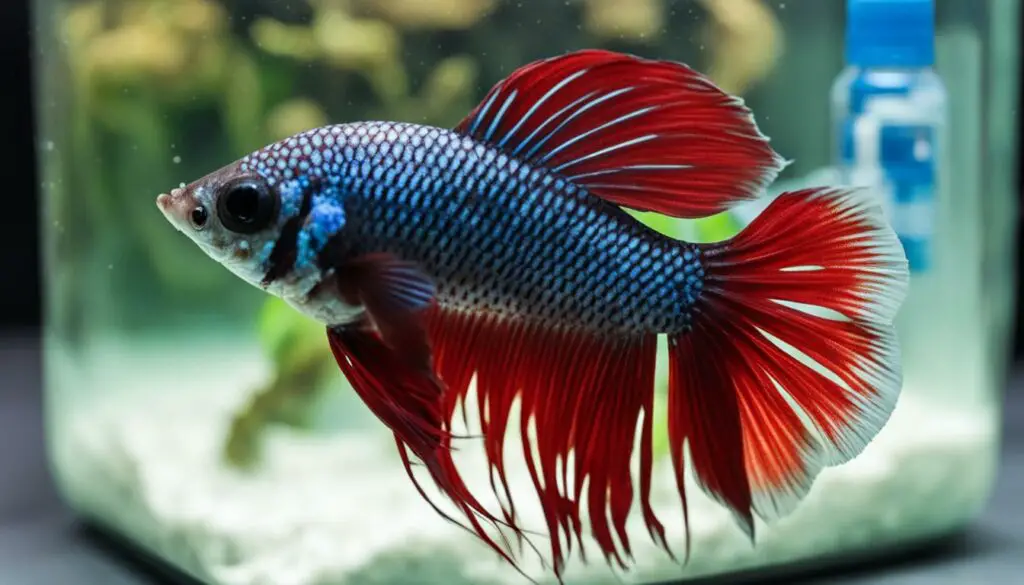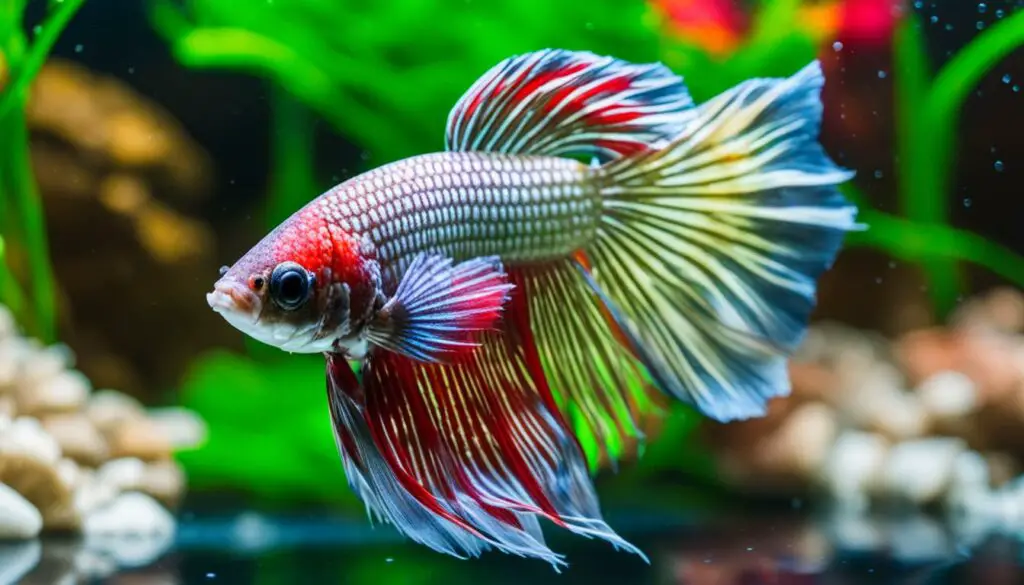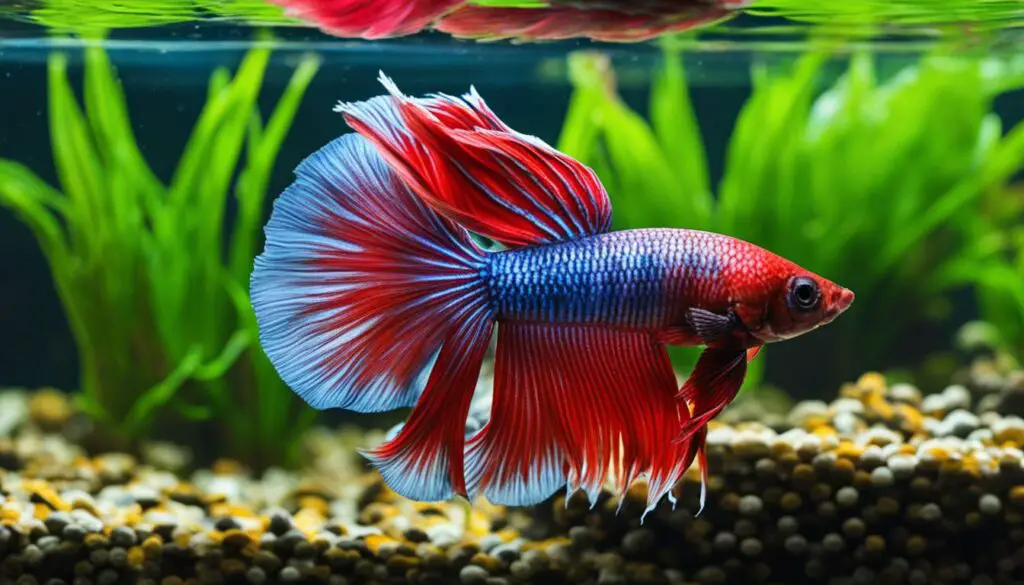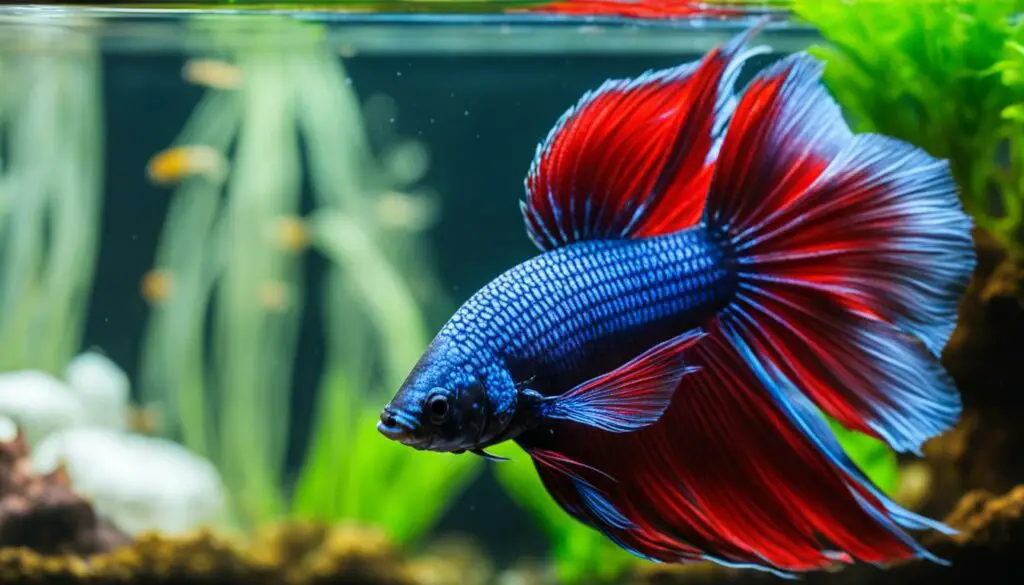Last Updated on 4 months by admin
Black spots on betta fish can be a concerning issue for pet owners. Not only do these spots impact the aesthetic appeal of your beloved fish, but they can also indicate underlying health problems. Fortunately, there are several methods and remedies for treating black spots on betta fish.
In this comprehensive guide, we will explore the common causes of black spots on betta fish, how to diagnose the issue, and effective home remedies and medications for treatment. We will also discuss the role of water quality, nutrition, and preventive measures in ensuring the health and well-being of your betta fish.
By the end of this guide, you will have a thorough understanding of how to treat black spots on betta fish and promote the long-term health of your pet.
Key Takeaways:
- Black spots on betta fish can indicate underlying health problems.
- Accurate diagnosis is essential for effective treatment.
- Home remedies and medications can both be effective treatments.
- Proper water quality and nutrition are crucial for betta fish health.
- Prevention is the best approach to avoiding black spots on betta fish.
Understanding Black Spots on Betta Fish
As a betta fish owner, it’s essential to be aware of common health issues that may affect your fish. One such issue is the appearance of black spots on the fish’s body. These spots can indicate various diseases, including:
- Fin Rot: A bacterial infection that affects the fins and tail of the betta fish. If left untreated, it can lead to black spots and tissue death.
- Ich: A parasitic infection that causes white spots on the body of the betta fish, which can eventually turn black.
- Septicemia: A bacterial infection that affects the bloodstream of the betta fish and can cause black spots to appear.
The presence of black spots can also be a sign of poor water quality, which can lead to stress and weakened immune systems in betta fish.
To ensure the well-being of your betta fish, it’s crucial to understand the underlying causes of these black spots. Next, we’ll discuss how to diagnose them.
Diagnosing Black Spots on Betta Fish
As a responsible betta fish owner, it’s essential to keep an eye on your pet’s health. In this section, we will discuss the signs and symptoms of black spots on betta fish to help you determine if your fish is affected.
There are several causes of black spots on betta fish. In some cases, the spots may be harmless and not indicative of any health issues. However, in other cases, black spots can be a sign of a more serious underlying condition, such as:
- Fin rot
- Ich
- Tuberculosis
- Hole in the head disease
Therefore, proper diagnosis is crucial to ensure that your fish receives the appropriate treatment.
One of the most obvious signs of black spots on betta fish is, of course, the appearance of the spots themselves. However, other symptoms may also be present, such as:
- Changes in behavior, such as lethargy or loss of appetite
- Abnormal breathing, such as rapid or labored breathing
- Changes in skin texture or color, such as redness or inflammation
If you notice any of these symptoms in addition to the appearance of black spots on your fish, it’s important to take action promptly.
It’s worth noting that black spots are not always a sign of a health issue. Sometimes, betta fish develop black spots due to natural pigmentation changes as they age. However, it’s always better to err on the side of caution and seek professional advice if you’re unsure.

“Proper diagnosis is crucial to ensure that your fish receives the appropriate treatment.”
Conclusion
Accurate diagnosis of black spots on betta fish is essential to determine the appropriate method for treatment. Understanding the potential causes and symptoms of black spots can help you identify the issue and take the necessary steps to address it. In the next section, we will discuss various home remedies that you can use to treat black spots on your betta fish.
Home Remedies for Treating Black Spots on Betta Fish
If you’re looking for natural and effective ways to treat black spots on your betta fish, there are several remedies you can try at home. While not all home remedies may work for every situation, these have been known to successfully address black spots and promote healing.
1. Salt Baths
Salt baths are a common and effective remedy for various betta fish health issues, including black spots. To prepare a salt bath, dissolve one tablespoon of aquarium salt per gallon of water. Place your betta fish in a separate container with the saltwater solution for 10-15 minutes. Repeat this process every other day for up to a week.
2. Garlic
Garlic has natural antibacterial properties that can help fight infections in betta fish. Crush a small garlic clove and mix it with your betta’s food, or soak the food in garlic juice before feeding. Repeat this for a week and monitor the progress of the black spots.
3. Indian Almond Leaves
Indian almond leaves contain antibacterial and antifungal properties that can promote healing and prevent infections in betta fish. Simply add one or two leaves to your betta’s tank and let them soak for a week. Replace the leaves with fresh ones every week to maintain the effectiveness.
4. Clean Water
Maintaining clean water is essential for treating and preventing black spots on betta fish. Regular water changes, tank vacuuming, and filter maintenance can go a long way in ensuring optimal water quality for your fish. Aim to change 25-50% of the water every week, depending on the size of the tank.
5. Vitamin C
Vitamin C is a natural and powerful antioxidant that can help boost your betta’s immune system and promote healing. Crush a vitamin C tablet and add it to your betta’s food, or dissolve it in the water. Repeat this process for a week and monitor the progress of the black spots.
While these home remedies can be effective in treating black spots on betta fish, it’s important to remember that they may not work for every case. If symptoms persist or worsen, it’s best to consult a veterinary professional for further advice and treatment options.

Medications for Treating Black Spots on Betta Fish
If natural remedies and treatments fail to improve your betta fish’s condition, medications may provide the necessary relief. It’s essential to consult with a veterinarian or a qualified aquatic specialist before administering any medication to your betta fish.
Types of Medications for Treating Black Spots
There are various types of medications available for treating black spots on betta fish. These medications usually target the underlying causes of the spots and promote overall healing. Some common medications for treating black spots on betta fish include:
| Medication Type | Description |
|---|---|
| Fungal medications | These medications treat fungal infections that may have caused black spots on your betta fish. They are usually available in liquid form and can be added to the fish tank water. |
| Bacterial medications | These medications treat bacterial infections that may have led to the appearance of black spots on your betta fish. The medication may be added to the water or administered directly to the fish’s affected area. |
| Salt-based medications | These medications contain salt as the primary ingredient and can help reduce inflammation, promote healing, and prevent further infection. They are usually available as powder or liquid and can be added to the fish tank water. |
It’s important to note that medication can have side effects and may not be suitable for all betta fish. Consult with a professional before administering any medication to your fish.
Administering Medications to Your Betta Fish
When administering medication to your betta fish, it’s essential to follow the instructions carefully. Different medications may have different dosages and application methods, so make sure you read and understand the product label or consult with a professional. Here are some general guidelines for administering medication to your betta fish:
- Make sure the medication is suitable for your betta fish’s condition
- Follow the prescribed dosage and application method
- Isolate the affected fish in a separate container to prevent other fish from ingesting the medication
- Monitor your fish’s response to the medication and adjust the treatment if necessary
- Continue the medication treatment for the recommended duration to ensure complete healing.
Medications can be an effective treatment for black spots on betta fish, but it’s essential to use them correctly and under professional guidance to avoid any adverse effects.

Water Quality and Maintenance
One of the most critical aspects of betta fish care is maintaining proper water quality. Poor water conditions can lead to numerous health issues, including the appearance of black spots on your fish. The following guidelines can help ensure optimal water quality and prevent this common problem.
Water Parameters
It’s essential to monitor the water parameters of your betta fish tank regularly. Ideal water parameters for bettas include a pH of 6.5 to 7.5, temperature between 76 to 82 degrees Fahrenheit, and ammonia and nitrite levels at 0 ppm. You can use a reliable water testing kit to monitor these levels and make necessary adjustments.

Tank Cleanliness
Cleanliness is critical when it comes to betta fish tanks. Regular tank cleaning can help reduce the buildup of harmful toxins and prevent the growth of bacteria that can lead to diseases such as fin rot and ich. We recommend doing a 25% water change weekly and a more thorough 50% water change every two weeks. Be sure to clean the substrate, filter, and decorations during these water changes.
Regular Maintenance Routines
Establishing a regular maintenance routine can help keep your betta fish tank clean and healthy. This routine should include weekly water changes, substrate cleaning, filter maintenance, and equipment checks. Be sure to remove any uneaten food and debris daily to prevent the buildup of toxins.
Conclusion
Proper water quality and maintenance are the foundation of good betta fish care. By monitoring water parameters, keeping the tank clean, and establishing a regular maintenance routine, you can help prevent many health problems, including black spots on your fish. Follow these guidelines and provide your betta with the clean, healthy environment they need to thrive.
Nutrition and Diet for Betta Fish Health
As with all living creatures, proper nutrition is essential for maintaining the health of betta fish. A balanced diet that meets the nutritional needs of your fish can help prevent a number of health issues, including black spots.
The recommended diet for betta fish includes a combination of high-quality pellets, freeze-dried or frozen foods, and live foods. Pellets should be the staple of your fish’s diet, as they contain all the necessary nutrients in a convenient, easily digestible form.
However, it is essential to ensure that the pellets you feed your betta are of high quality and specially formulated for betta fish. Avoid generic fish food that lacks the necessary nutrients and can lead to health problems.
Additionally, supplementing your betta’s diet with freeze-dried or frozen foods such as brine shrimp or bloodworms can provide your fish with essential protein and variety.
Live foods, such as mosquito larvae or daphnia, can also be incorporated into your betta’s diet. However, be cautious when feeding live foods, as they can carry parasites that can be harmful to your fish. It is recommended to quarantine live foods before feeding them to your betta.
When feeding your betta, it’s important to avoid overfeeding, as this can lead to obesity and other health issues. A good rule of thumb is to feed your fish small, frequent meals throughout the day, rather than one large meal.
Choosing the Right Betta Fish Food
When selecting food for your betta fish, it’s important to consider their nutritional needs. Look for foods that specifically say they are formulated for betta fish, and that contain high levels of protein and essential vitamins and minerals.
You may also want to consider the type of food your betta prefers. While pellets are the primary source of nutrition for betta fish, some may prefer freeze-dried or frozen foods or live foods. Be sure to observe your fish carefully and adjust their diet accordingly.
Finally, it’s essential to store your betta fish food correctly. Keep it in a cool, dry place, and ensure that it is not exposed to moisture or direct sunlight. Always check the expiration date before feeding your fish, and discard any food that has gone bad.

Betta Fish Care Tips
- Keep your betta’s tank clean and well-maintained to prevent the growth of harmful bacteria and parasites.
- Provide your betta fish with plenty of swimming space and hiding spots, such as plants and decorations.
- Monitor your betta fish regularly for signs of illness or distress, such as lethargy, loss of appetite, or unusual behavior.
- Take care when handling your betta fish, as they are delicate and can easily be injured.
- Consult with a veterinary professional if you notice any signs of illness in your betta fish, or if you have any concerns about their health.
Preventive Measures for Black Spots on Betta Fish
Preventive measures can go a long way in ensuring the health and well-being of your betta fish. These tips can help minimize the chances of your fish developing black spots and other health issues.
1. Proper Tank Size and Habitat
Ensure that your betta fish has sufficient space to swim and explore. A tank that is too small can lead to stress and disease, including the appearance of black spots. The recommended tank size for a betta fish is at least 2.5 gallons. Also, provide suitable hiding spots, plants, and rocks to create a comfortable and stress-free habitat for your fish.
2. Maintain Proper Water Parameters
Regularly monitor and maintain the water parameters in your betta fish tank. The ideal temperature range is between 76°F to 81°F, and the pH should be between 6.5 to 7.5. Avoid sudden changes in water temperature, and perform regular water changes to keep the environment clean and healthy.
3. Avoid Overfeeding
Overfeeding can lead to bloating, constipation, and other digestive issues that can trigger the appearance of black spots. Feed your betta fish small amounts of food 2-3 times a day. Choose high-quality pellet or flake food that is specifically formulated for betta fish.
4. Regular Tank Maintenance
Perform routine tank maintenance, including water changes, filter cleaning, and substrate vacuuming. Remove any uneaten food, dead plants, or debris from the tank promptly to prevent the buildup of harmful bacteria and toxins.
5. Quarantine New Fish
If you plan to introduce new fish to your betta’s tank, quarantine them in a separate tank for at least two weeks before introducing them into the main tank. This step can help prevent the spread of diseases and infections that can trigger black spots and other health issues.

Remember, prevention is always better than cure when it comes to betta fish health. By following these simple tips, you can provide a safe and healthy environment for your fish.
Consulting a Veterinary Professional
While many cases of black spots on betta fish can be effectively treated with home remedies or medication, it is important to know when to seek professional help for your fish. If you notice that your betta’s condition is not improving despite your best efforts, or if the black spots seem to be spreading or increasing in severity, it may be time to consult a veterinary professional.
A qualified veterinarian with experience in treating fish can provide specialized care and diagnosis for your betta. They may perform tests to determine the exact cause of the black spots and recommend appropriate treatment options. They can also provide advice on betta fish care and maintenance to prevent future health issues.
When choosing a veterinary professional, it is essential to select one with experience in treating betta fish specifically. Not all veterinarians may have this expertise, so you may need to do some research to find a suitable professional in your area.
Remember, consulting a veterinary professional is not a sign of failure or weakness as a pet owner. It is a responsible and proactive step in ensuring the health and well-being of your beloved betta fish.

As with any pet, regular check-ups with a veterinarian can help prevent and address health issues before they become more severe. This is especially important for betta fish, as they are susceptible to a variety of health issues if proper care is not provided.
Important Note:
If you notice any sudden or severe changes in your betta fish’s behavior, appearance, or appetite, it is important to seek veterinary care immediately. These could be signs of a more serious health issue that requires urgent attention.
Additional Tips for Betta Fish Health
Aside from the specific treatments for black spots on betta fish, there are several general tips and practices you can follow to ensure the overall health and well-being of your fish.
Keep the tank clean
Regular tank maintenance is crucial for keeping your betta fish healthy and happy. Perform partial water changes at least once a week, and use a gravel vacuum to remove any debris on the bottom of the tank. Use a water conditioner to neutralize any harmful chemicals in the tap water.
Provide proper nutrition
Offer your betta fish a diverse and balanced diet. Betta fish require a mix of protein and vegetables, such as pellets, bloodworms, and brine shrimp. Overfeeding can lead to health problems, so feed your betta small portions only a few times a day.
Monitor water temperature
Betta fish are tropical fish and require warm water to thrive. Keep the water temperature between 76 to 82 degrees Fahrenheit, and use a heater to maintain a consistent temperature. Fluctuations in water temperature can cause stress and illness in betta fish.
Add hiding places and decor
Betta fish enjoy having hiding places and decor in their tanks. Add plants, rocks, and other decorations to create a stimulating and comfortable environment for your fish to explore. Avoid adding any sharp or rough objects that could injure your fish.

Observe your fish regularly
Take the time to observe your fish regularly and look for any signs of illness or distress. Pay attention to their behavior, appetite, and physical appearance. If you notice any unusual changes, take action immediately.
By following these tips, you can ensure that your betta fish stays healthy and happy. Remember to always prioritize their care and well-being, and seek professional help when necessary.
Conclusion
As a responsible betta fish owner, taking care of your fish’s health and well-being should be your top priority. Black spots on betta fish can be a cause of concern, but with proper diagnosis and treatment, you can help your fish recover and thrive.
We discussed the various causes and symptoms of black spots on betta fish, as well as effective treatments including both home remedies and professional medications. In addition, we highlighted the importance of proper water quality and maintenance, as well as a well-balanced diet to prevent and treat black spots.
Taking Preventive Measures
Prevention is always better than a cure, and by following best practices in betta fish care and habitat management, you can minimize the chances of your fish developing black spots. Remember to maintain a clean and suitable environment for your fish, and monitor their behavior and health regularly for any signs of distress.
Consulting a Veterinary Professional
If you are dealing with persistent or severe cases of black spots on your betta fish, consulting a veterinary professional is advisable. A professional can provide a more accurate diagnosis and recommend the appropriate treatment plan for your fish’s specific needs.
By following the steps outlined in this guide, you can ensure your betta fish’s long-term health and happiness. With proper care and attention, you can enjoy a beautiful and thriving betta fish in your home.
FAQ
What are the common causes of black spots on betta fish?
Black spots on betta fish can be caused by various factors such as bacterial or fungal infections, poor water quality, stress, or even genetics.
How can I tell if my betta fish has black spots?
Look for the appearance of dark or black patches on your betta fish’s body or fins. These spots may vary in size and can be accompanied by other symptoms such as lethargy or loss of appetite.
Can black spots on betta fish be treated at home?
Yes, there are home remedies available for treating black spots on betta fish. These may include improving water quality, adding aquarium salt, or using natural treatments like tea tree oil or betta-specific medications.
When should I consult a veterinary professional for black spots on my betta fish?
It is advisable to seek professional help if the black spots on your betta fish persist or worsen despite home remedies, or if your fish shows other concerning symptoms such as difficulty breathing or severe behavioral changes.
How can I prevent black spots on my betta fish?
To prevent black spots on betta fish, it is important to maintain proper water quality, provide a healthy and balanced diet, and minimize stress factors such as overcrowding or sudden changes in the environment.
What other measures can I take to ensure the health of my betta fish?
In addition to treating black spots, you can promote your betta fish’s overall health by keeping their tank clean, providing stimulating environments, and monitoring their behavior and appetite regularly.

